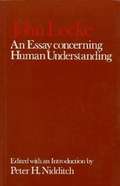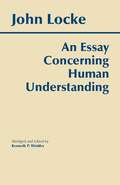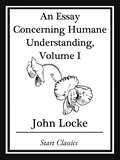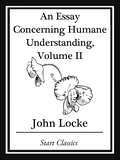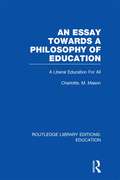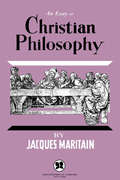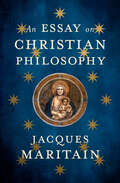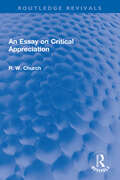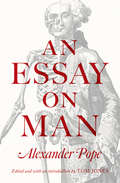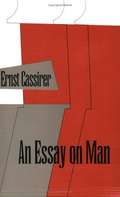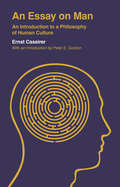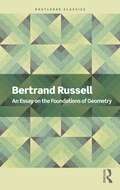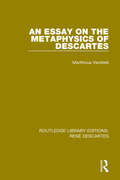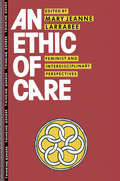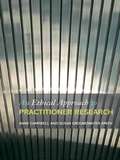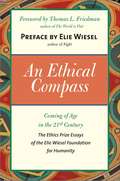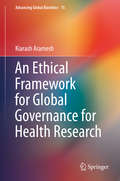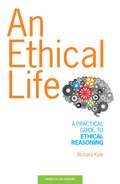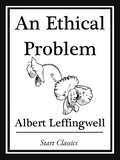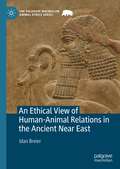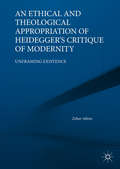- Table View
- List View
An Essay Concerning Human Understanding
by John Locke Peter H. NidditchPublished in 1689, John Locke's pioneering investigation into the origins, certainty, and extent of human knowledge set the groundwork for modern philosophy and influenced psychology, literature, political theory, and other areas of human thought and expression.
An Essay Concerning Human Understanding
by John Locke Kenneth P. WinklerIncludes generous selections from the Essay, topically arranged passages from the replies to Stillingfleet, a chronology, a bibliography, a glossary, and an index based on the entries that Locke himself devised.
An Essay Concerning Human Understanding
by John LockeIn An Essay Concerning Human Understanding, first published in 1690, John Locke (1632-1704) provides a complete account of how we acquire everyday, mathematical, natural scientific, religious and ethical knowledge. Rejecting the theory that some knowledge is innate in us, Locke argues that it derives from sense perceptions and experience, as analysed and developed by reason. While defending these central claims with vigorous common sense, Locke offers many incidental - and highly influential - reflections on space and time, meaning, free will and personal identity. The result is a powerful, pioneering work, which, together with Descartes's works, largely set the agenda for modern philosophy.
An Essay Concerning Humane Understanding, Volume I
by John LockeJohn Locke is widely regarded as the father of classical liberalism. This essay was groundbreaking in its approach to foundation of human knowledge and understanding, he describes the mind at birth as a blank slate filled later through experience, the essay became the principle sources of empiricism in modern philosophy and influenced many enlightenment philosophers. Many of the earliest books, particularly those dating back to the 1900s and before, are now extremely scarce and increasingly expensive.
An Essay Concerning Humane Understanding, Volume II
by John LockeJohn Locke is widely regarded as the father of classical liberalism. This essay was groundbreaking in its approach to foundation of human knowledge and understanding, he describes the mind at birth as a blank slate filled later through experience, the essay became the principle sources of empiricism in modern philosophy and influenced many enlightenment philosophers. Many of the earliest books, particularly those dating back to the 1900s and before, are now extremely scarce and increasingly expensive.
An Essay Towards A Philosophy of Education: A Liberal Education for All (Routledge Library Editions: Education)
by Charlotte M MasonThis was the last and most important and comprehensive work of Charlotte Mason, (founder of the Parents’ National Educational Union). For more than half a century the practical results of her original thought on education could be seen in all parts of the world in the Charlotte Mason Method and the Parents’ Union Schools.
An Essay for Ezra: Racial Terror in America (Thinking Theory)
by Grant FarredAn intensely personal, and philosophical, account of why white America&’s racial unconscious is not so unconsciousAn Essay for Ezra is a critique of terror that begins but by no means ends with the presidency of Donald J. Trump. A father addresses his son and a boy shares his observations in a dynamic dialogistic exchange that is a commentary of and for its time, taking the measure of racial terror and of white supremacy both in our moment and as a historical phenomenon.Framed through the experiences of the author&’s biracial son, An Essay for Ezra is intensely personal while also powerfully universal. Drawing on the social and political thought of James Baldwin and Martin Luther King, Grant Farred examines the temptation and the perils of essentialism and the need to discriminate—to engage the black mind as much as the black body. With that dialectic as his starting point, Farred engages the ideas of Jameson, Barthes, Derrida, Adorno, Kant, and other thinkers to derive an ethics of being in our time of social peril. His antiessentialist racial analysis is salient, especially when he deploys Dave Chappelle as a counterpoint to Baldwin—and Chappelle&’s brilliant comic philosophic voice jabs at both racial and gender identity.Standing apart for its willingness to explore terror in all its ambivalence, this theoretical reflection on racism, knowledge, ethics, and being in our neofascist present brings to bear the full weight of philosophical inquiry and popular cultural critique on black life in the United States.
An Essay on Christian Philosophy
by Jacques MaritainThis original translation, by Edward H. Flannery, brings you one of Maritain's most eye-opening studies of Christianity. Although not his most famous work, Maritain's An Essay on Christian Philosophy provides readers with an in-depth analysis and careful philosophical approach to the study of theology and, at the time of original publication, was considered to be the definitive statement of the Thomistic position. Discover his theses for yourself as Maritain considers the nature of philosophy, morality, and their relations to Christianity with clarity and a scholarly attention to detail. Flannery provides English readers with a glossary of terms to bring further understanding to Maritain's original words. Jacques Maritain was a French Catholic philosopher and political thinker. He was born in Paris in 1882, where he spent most of his life. His father was a prominent lawyer and his mother the daughter of a statesman. He attended the Sorbonne to study philosophy and natural science, and after marrying, he and his wife converted to Catholicism. It was after this he became a well-known scholar of St. Thomas Aquinas and Thomistic philosophy. He published widely on philosophical and political thought, and by the 1930s, he was an established thinker in the Catholic community. After the outbreak of WWII, Maritain relocated to the United States, where he taught at Princeton University and Columbia University. Later in life, he and his wife returned to France, where he continued to write and study Catholic scholarship until his death in 1973.
An Essay on Christian Philosophy
by Jacques MaritainThis important essay by the French Catholic philosopher articulates the foundation for his influential interpretations of Thomas Aquinas. Known for his influential writings that brought fresh relevance to the work of Thomas Aquinas, Jacques Maritain was one of the most important Catholic philosophers of the twentieth century. Although An Essay on Christian Philosophy is not generally considered to be among his major works, it is, in a sense, the key to unlocking his massive synthesis of modern Thomism. This provocative essay reveals the inner springs of Maritain&’s ideas concerning mankind&’s relationship to God. This lucid translation by Edward H. Flannery includes a glossary of technical terms, making it even more accessible for the general reader.
An Essay on Critical Appreciation (Routledge Revivals)
by Ralph W. Church dec'dFirst published in 1938, An Essay on Critical Appreciation aims to provide a language suited for the explication on beauty. This explication is not based merely on emotion but is motivated by contemplation and discrimination. By virtue of being rendered in a discourse, an appreciation can claim to be critical or discriminating and ‘beauty’ can be said to have characteristics. The search of such a language takes the author through the contemplation on the meaning of ‘beauty’, entertaining contrary views, and reaching at an understanding of the aesthetic situation. This book will be of interest to students of English literature, philosophy and art.
An Essay on Man
by Alexander Pope Tom JonesVoltaire called it "the most sublime didactic poem ever written in any language." Rousseau rhapsodized about its intellectual consolations. Kant recited long passages of it from memory during his lectures. And Adam Smith and David Hume drew inspiration from it in their writings. This was Alexander Pope's Essay on Man (1733-34), a masterpiece of philosophical poetry, one of the most important and controversial works of the Enlightenment, and one of the most widely read, imitated, and discussed poems of eighteenth-century Europe and America. This volume, which presents the first major new edition of the poem in more than fifty years, introduces this essential work to a new generation of readers, recapturing the excitement and illuminating the debates it provoked from the moment of its publication.Echoing Milton's purpose in Paradise Lost, Pope says his aim in An Essay on Man is to "vindicate the ways of God to man"--to explain the existence of evil and explore man's place in the universe. In a comprehensive introduction, Tom Jones describes the poem as an investigation of the fundamental question of how people should behave in a world they experience as chaotic, but which they suspect to be orderly from some higher point of view. The introduction provides a thorough discussion of the poem's attitudes, themes, composition, context, and reception, and reassesses the work's place in history. Extensive annotations to the text explain references and allusions.The result is the most accessible, informative, and reader-friendly edition of the poem in decades and an invaluable book for students and scholars of eighteenth-century literature and thought.
An Essay on Man: An Introduction to a Philosophy of Human Culture
by Ernst CassirerCassirer explores the question "what is man?" and explores man in terms of his human culture.
An Essay on Man: An Introduction to a Philosophy of Human Culture (Veritas Paperbacks)
by Ernst CassirerOne of the twentieth century&’s greatest philosophers presents the results of his lifetime study of man&’s cultural achievementsAn Essay on Man is an original synthesis of contemporary knowledge, a unique interpretation of the intellectual crisis of our time, and a brilliant vindication of man&’s ability to resolve human problems by the courageous use of his mind. In a new introduction Peter E. Gordon situates the book among Cassirer&’s greater body of work, and looks at why his &“hymn to humanity in an inhuman age&” still resonates with readers today. &“The best-balanced and most mature expression of [Cassirer&’s] thought.&”—Journal of Philosophy &“No reader of this book can fail to be struck by the grandeur of its program or by the sensitive humanism of the author.&”—Ernest Nagel, The Humanist &“A rare work of philosophy and a rare work of art.&”—Tomorrow
An Essay on the Foundations of Geometry (Routledge Classics)
by Bertrand RussellAn Essay on the Foundations of Geometry was first published in 1897 when Bertrand Russell was 25 years old. It marks his first major foray into analytic philosophy, a movement in which Russell is one of the founding members and figurehead. It provides a brilliant insight into Russell's early philosophical thought and an engaging and authoritative introduction to the philosophical and logical foundations of geometry - a version of which was fundamental to Einstein's theory of relativity. Russell explores and introduces the concepts of geometry and their philosophical implications, including a historical overview of geometrical theory, making it an invaluable resource not only for students of philosophy but anyone interested in the origins of the thought of one of the twentieth century's most important and widely-read philosophers. This Routledge Classics edition includes a new Foreword by Michael Potter.
An Essay on the History of Civil Society
by Fania Oz-Salzberger Adam FergusonAdam Ferguson's Essay on the History of Civil Society (first published in 1767) is a classic of the Scottish--and European--Enlightenment. Drawing on such diverse sources as classical authors and contemporary travel literature, Ferguson combines a subtle analysis of modern commercial society with a critique of its abandonment of civic and communal virtues. Central themes in Ferguson's theory of citizenship are conflict, play, political participation and military valor. The Essay is a bold and novel attempt to reclaim the tradition of active citizenship in the modern state.
An Essay on the Metaphysics of Descartes (Routledge Library Editions: Rene Descartes #4)
by Marthinus VersfeldOriginally published in 1940, this book provides a thorough discussion of René Descartes philosophy of metaphysics, examining the three major points of the mind and body, freedom of the will and religion and science. Specific chapters are devoted to the Cartesian theory and the Meditations, in particular the Sixth.
An Ethic of Care: Feminist and Interdisciplinary Perspectives (Thinking Gender)
by Mary Jeanne LarrabeePublished in 1982, Carol Gilligan's In a Different Voice proposed a new model of moral reasoning based on care, arguing that it better described the moral life of women. An Ethic of Care is the first volume to bring together key contributions to the extensive debate engaging Gilligan's work. It provides the highlights of the often impassioned discussion of the ethic of care, drawing on the literature of the wide range of disciplines that have entered into the debate. Contributors: Annette Baier, Diana Baumrind, Lawrence A. Blum, Mary Brabeck, John Broughton, Owen Flanagan, Marilyn Friedman, Carol Gilligan, Catherine G. Greeno, Catherine Jackson, Linda K. Kerber, Mary Jeanne Larrabee, Zella Luria, Eleanor E. Maccoby, Linda Nicholson, Bill Puka, Carol B. Stack, Joan C. Tronto, Lawrence Walker, Gertrud Nunner-Winkler.
An Ethical Approach to Practitioner Research: Dealing with Issues and Dilemmas in Action Research
by Anne Campbell Susan Groundwater-SmithPractice based research is burgeoning in a number of professional areas. An Ethical Approach to Practitioner Research covers a comprehensive range of issues and dilemmas encountered in practitioner and action research contexts. While principally focused upon practitioner inquiry in education it takes account of, and acknowledges that others engaged in professional practice such as in legal, nursing and social care contexts, face similar issues and dilemmas. It aims to stimulate ethical thinking and practice in enquiry and research contexts. Following moves to promote professional learning and development in the workplace, there is an increase in the number of practitioners engaging in action or inquiry based learning in the workplace supported by university staff or consultants, as evidenced in the emergence of professional learning communities and learning networks. There are many tensions inherent in relationships between practitioners and academics in terms of the setting of the research agenda, the policy implications that may flow from it and the right to publish outcomes. Negotiating that relationship requires ethical probity where each party recognises, understands and respects mutual responsibilities. The book explores this through a wide variety of roles from those of academic researchers, consultants and teachers to professional practitioners as researchers and, importantly, students and children. It therefore illustrates a number of differing perspectives about ethics and research which are allied to those roles Drawing on the expertise of international researchers and academics from America, Australia and Europe, the book provides invaluable support to the novice researcher and illuminates some of the more intricate issues for the more experienced research practitioner.Packed with detailed and thought-provoking examples this book contains both theoretical analyses of ethical matters and offers practical advice to practitioner and action researchers across the fields of schools hospitals and community and family settings.
An Ethical Compass: The Ethics Prize Essays of the Elie Wiesel Foundation for Humanity
by Thomas L. FriedmanIn 1986, Elie Wiesel received the Nobel Peace Prize in recognition of his victory over “the powers of death and degradation, and to support the struggle of good against evil in the world.” Soon after, he and his wife, Marion, created the Elie Wiesel Foundation for Humanity. A project at the heart of the Foundation’s mission is its Ethics Prize—a remarkable essay-writing contest through which thousands of students from colleges across the country are encouraged to confront ethical issues of personal significance. The Ethics Prize has grown exponentially over the past twenty years. “Of all the projects our Foundation has been involved in, none has been more exciting than this opportunity to inspire young students to examine the ethical aspect of what they have learned in their personal lives and from their teachers in the classroom,” writes Elie Wiesel. Readers will find essays on Bosnia, the genocide in Rwanda, sweatshops and globalization, and the political obligations of the mothers of Argentina’s Disappeared. Other essays tell of a white student who joins a black gospel choir, a young woman who learns to share in Ladakh, and the outsize implications of reporting on something as small as a cracked windshield. Readers will be fascinated by the ways in which essays on conflict, conscience, memory, illness (Rachel Maddow’s essay on AIDS appears), and God overlap and resonate with one another. These essays reflect those who are “sensitive to the sufferings and defects that confront a society yearning for guidance and eager to hear ethical voices,” writes Elie Wiesel. “And they are a beacon for what our schools must realize as an essential component of a true education.”
An Ethical Critique of Fur Factory Farming (The Palgrave Macmillan Animal Ethics Series)
by Andrew Linzey Clair LinzeyThe fur trade is a multi-million-dollar industry. It is estimated that over 100 million animals are killed in fur farms worldwide annually. This book provides an in-depth analysis of the state of fur factory farming worldwide, and an ethical critique of the main arguments propounded by the fur industry. Consideration is also given to an attempt to justify fur farming through the concept of “Welfur." Andrew Linzey and Clair Linzey argue that from any ethical perspective, fur factory farming fails basic moral tests.
An Ethical Framework for Global Governance for Health Research (Advancing Global Bioethics #15)
by Kiarash ArameshThis book provides a comprehensive description and ethical analysis of one of the most challenging areas: international health research. Furthermore, it provides a vivid portrait of the current situation of global governance for health research and its main challenges and suggests a comprehensive and universal ethical framework based on the existing theories and frameworks. This work is a must-read for all the students, scholars, professionals, activists, and policy-makers who are involved or interested in the global health research enterprise and its governance and ethics.
An Ethical Life: A Practical Guide to Ethical Reasoning
by Richard KyteEthics isn't just a set of principles to study, but a skill to practice. By introducing a logical 4-Way Method, An Ethical Life demonstrates how everyone has the capability to work out complex and real ethical dilemmas.
An Ethical Problem
by Albert LeffingwellWritten by physician and social reformer, Albert Leffingwell sheds light on the abusive experimentation on man and animals.
An Ethical View of Human-Animal Relations in the Ancient Near East (The Palgrave Macmillan Animal Ethics Series)
by Idan BreierExploring the earliest literary evidence for human-animal relations, this volume presents and analyzes biblical and Mesopotamian (Sumerian, Assyrian, and Babylonian) sources from the third millennium BCE through to the consolidation of the biblical literature in the first millennium BCE. Key Features:Provides the first comprehensive study of these texts from an ethical perspective.Examines proverbs, popular aphorisms, myths, epic literature, wisdom literature, historiography, prophecy, and law codes.Applies methodology from current contemporary biblical and ancient Near Eastern scholarship and human-animal ethics, thereby raising new questions that lead to fresh insights.An Ethical View of Human Animal-Relations in the Ancient Near East is essential reading for scholars and graduate students of animal ethics, applied ethics and biblical studies.
An Ethical and Theological Appropriation of Heidegger’s Critique of Modernity: Unframing Existence
by Zohar AtkinsThis book is at once a deeply learned and original reading of Heidegger and a primary text in its own right. It demonstrates the relevance of Heidegger’s thought in responding to the moral and religious challenges of 21st century existence. It shows that Heidegger’s project can be defended against many criticisms once its existential character is taken seriously. What emerges is a powerful exercise in thinking, not about Heidegger, but with and against him. As such, Atkins engages Heidegger as a means of advancing a defense of spirituality in the modern world that holds spirituality itself accountable for its lapses into the mundane. Addressing the most influential figures in recent Continental philosophy, such as Emmanuel Levinas and Theodor W. Adorno, this is a work that will be of timely use to philosophers, theologians, artists, and seekers.
